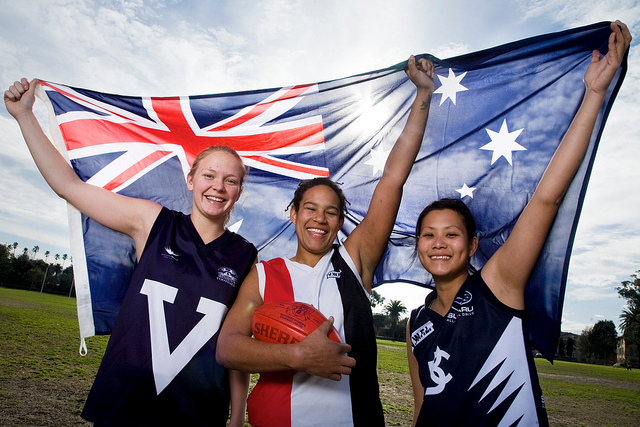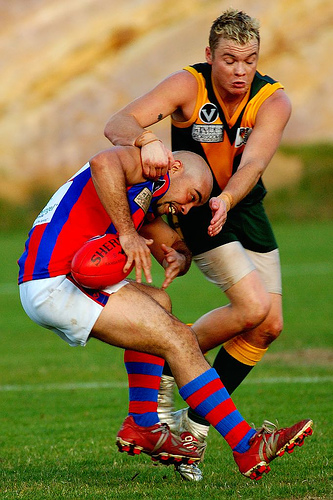
A trio of Australian football players. Photo © DIBP Images, licensed Creative Commons Attribution.
There is hardly anything more important in Australia than sports. Whether it is the Olympics, the footy, the tennis, the Melbourne Cup, a host of other exciting professional events, or just a game of professional or backyard cricket, nothing unites and rivets Australians like sports. There is hardly an Aussie who is not involved in some sort of sporting experience, at least in their younger days, and sports are a regular outdoor feature of Australian school life.The biggest crowds come out for football, which comes in four flavors—soccer, Rugby Union, Rugby League, and Australian Rules football—to divide the focus. The truly unifying national game is cricket, and the 11 members of Australia’s national team are household names. It doesn’t hurt that Australia has been the dominant force in world cricket for more than a decade, winning three consecutive World Cups in 1999, 2003, and 2007.
Australian Rules football is the most different from games played in other countries and is the most popular. Aussie Rules is the sport of choice in Melbourne, Perth, and Adelaide; rugby is more popular in Sydney and Brisbane.
Cricket is a relative of baseball and is the main summer sport. Innumerable families and kids play backyard cricket, which supplies a stream of players to local clubs, who in turn supply the state teams and the national team. The national team plays five-day matches, called tests, against the top nine other cricketing nations. These events grip the nation on television, radio, or live at legendary cricket grounds such as the MCG (Melbourne), Sydney Cricket Ground, the Gabba (Brisbane), the Wakka (Perth), and the Adelaide Cricket Ground. Cricket and football memoirs are routinely best-sellers in Australia.
In addition to the main spectator sports, golf, tennis, surfing, and the Olympics are highly popular, and Australia wins a completely disproportionate number of medals for its population. In 2000 Australia won 58 medals at the Summer Games in Sydney, fourth among all nations and one behind China, which has 60 times Australia’s population. Australia has racked up large numbers of medals in almost every Olympics in men’s and women’s swimming. In 2004 in Athens, Australia again finished fourth; in 2008 the team won 46 medals, coming sixth; but alas in 2012 Australia won 35 medals, coming in 10th place.

There’s always lots of action in a game of Australian rules football. Photo © Mugley, licensed Creative Commons Attribution.
There is a National Sports Academy, and promising young athletes are whisked away for training at an early age. In golf, legends such as Greg Norman, Stuart Appleby, Ian Baker-Finch, and Steve Elkington have been noted winners of major championships, while numerous Australians have achieved tennis fame at Wimbledon and other grand-slam events, including John Newcombe, Margaret Court, Evonne Goolagong, Pat Cash, Patrick Rafter, and Lleyton Hewitt. In Melbourne, the Melbourne Cup horse race is a public holiday, and for years the country has shut down for a few minutes during the running of the race.To many Australians, personal sports are of far more importance: surfing, skiing, running, windsurfing, sailing, climbing, tennis, golf, and backyard cricket. There is hardly an Aussie who is not involved in some sort of sporting experience, at least in their younger days, and sports are a regular outdoor feature of Australian school life. Many private boys and girls schools make two sports compulsory through year 10 or 11, and Australians are generally relentlessly fit and eager to participate in a wide variety of sporting activities. It is often the glue that holds families and neighborhoods together, if not in participation then at least in cheering for a team. If you are moving to Melbourne, try to pick an AFL team, preferably before you arrive, because you will be asked about it from the moment you arrive.
Excerpted from the Second Edition of Moon Living Abroad in Australia.